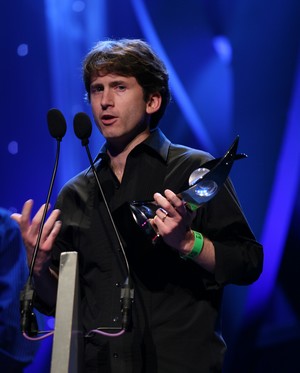
Todd Howard is a member of the Academy of Interactive Arts & Sciences. He spoke at the D.I.C.E. Summit® in 2009. He works for Bethesda.
Q: How do you want to be remembered?
A: I'd like the games themselves to be remembered well, that many years from now people still see them as important titles for their time. For me personally, it's more about how I'm remembered by those I've worked with. When I look back at my games, I think less about the actual product and more about the journey of making them. I just hope that those around me enjoyed our time together as much as I did, and that we all made each other better in many ways.
Q: Are games important?
A: As entertainment, I think they're the ultimate. You get to experience something as opposed to observing it.
Q: How do you measure success?
A: I think it's the whole package. Of course you want your games to be critically acclaimed and sell great, but there's this really hidden side to it, which is the internal expectations and the outlook of those you work with. Did we do what we set out to do? Did we not go completely crazy doing it? True success is when you do something and then everyone involved says "let's do it again!"
Q: What game are you most jealous of?
A: Currently? GTA IV. Big ideas, clear vision, and gets the little things right.
Q: What's your favorite part of game development?
A: It's the small victories, when the game is really working, you're playing it and you see an opportunity to make something more fun, by either removing something, adding something, or tweaking a game balance number. I think it's easy to dream big, but the fine details are where it happens. Using what’s at your disposal to squeeze out even more fun is very rewarding.
Q: Tell us one of your recent professional insights.
A: 'Fun' does not mean 'challenge.'
Q: What's the one problem of game development you wish you could instantly solve?
A: Technology and the discipline to use it correctly. I see a lot of groups still struggle on each game with the basics, from rendering speed to load times. I think the best ideas don't emerge until the platforms and tech are stable, because early on you spend all your time just getting something to "work," and then you're satisfied, as opposed to iterating it until it "works great."
Q: Do you think it's important for developers to continue playing games?
A: Of course. Most of the time, an idea you have has been tried in some form before. It's faster to play it then sit around thinking about its merits. I think it's also important for developers to finish games they play. You need to see a game's entire arc, and think about what parts you found the most rewarding.
Q: What's the biggest challenge you see facing the industry?
A: That it will pigeon-hole itself. I'm worried the Wii is getting stuck with quick-buck games aimed at children who don't know any better, and the 360 and PS3 are all about M rated killfests. As an industry, we have to make sure the world knows that gaming is for everyone, and not just kids or thirtysomethings who never grew up.
Q: Finally, when you look at the future is there one great big trend that affects everyone?
A: The number of new people playing games. Everyone needs to think about the player who is playing for the first time and really figure out what confuses them, or how they can have 'real fun' while they learn the game. Frustration is the number one reason people of all skill levels stop playing. Everyone needs to get better at the 'learn-play-challenge' design ramp.
Questions by Evan Van Zelfden